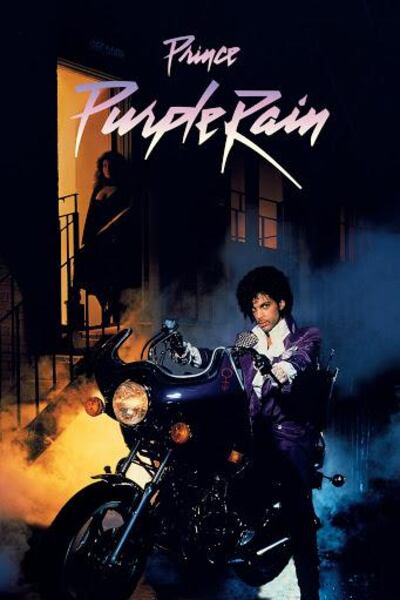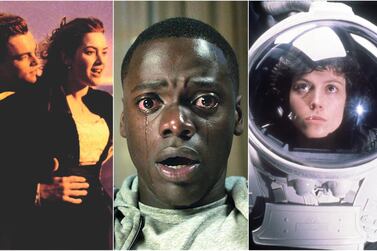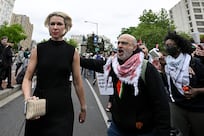Something strange happens to popular musicians when movies appear on their horizon. British stadium rockers Muse, for example, are releasing a film called Simulation Theory this week, on Imax screens worldwide. According to the band, it is a concert film. But also a sci-fi epic.
That sounds ambitious, but pop stars have an intriguingly quirky history, cinematically, and they keep trying. Last week, Madonna and Megan Thee Stallion spoke about their screenplays in the works. Stallion's film is probably a horror that "definitely blows your mind," the rapper boasted to Variety magazine.
Films by major musicians often feel like vanity projects. Think Michael Jackson's Moonwalker (1988), which blended concert footage with hard-to-navigate narratives about fan worship and press intrusion. Reviews were bad, but business was huge, so you can see the appeal for studios. By giving power to a pop star, they depower their old enemy: the critics.
Critical appraisals of these films tend to evolve, however, as cult appeal kicks in; the really strange ones often begin as wildly imaginative concept albums. Muse's Simulation Theory is based on their 2018 album, and "has this whole thing about a virus", singer Matt Bellamy told the music news website NME. But "very much in a fictional world. It's a bit of fun".
Perhaps, but Bellamy also described the film as "like our version of The Wall", arguably the archetypal rock concept movie. Derived from a 1979 Pink Floyd album, it stars a pre-Live Aid Bob Geldof as an alienated, hallucinatory rock star. The great US critic Roger Ebert called it "one of the most horrifying musicals of all time". Not fun.
This weirdness really began in the mid-1960s as studios commissioned movie vehicles for popular acts without caring too much about the content between the songs. So, innovative bands such as The Beatles tested the waters. Yellow Submarine was their surreal highpoint – a cartoon Fab Four battle undersea Blue Meanies – but even their poppier earlier films featured freaky moments: sinister cults, unsettling magicians and bizarre guests.
Such films were useful stages for new filmmakers, too. London beat group The Dave Clark Five's surprisingly downbeat Catch Us If You Can was the first film by John Boorman, who would eventually direct a much darker guys-on-tour film: Deliverance. In the US, meanwhile, The Monkees' brazenly bizarre movie Head was co-written by Jack Nicholson, pre-fame.
That '60s surrealism seemed contagious. Head also featured the US art-rocker Frank Zappa, who would then launch the prog-rock movie decade, with 1971's 200 Motels. A twisted mockumentary full of psychedelic effects, it co-starred ex-Beatle Ringo Starr as a Zappa impersonator, Larry the Dwarf (random pop cameos were oddly common).
Also guest featuring – as a nun – was Keith Moon, from The Who, a band whose concept albums became staples of '70s cinema. Songwriter/screenwriter Pete Townshend and director Ken Russell turned their rock opera Tommy into a spectacle, including a fabulous turn by Elton John, although John had actually advised first choice Rod Stewart to turn it down. "Then Pete Townsend from The Who rang me," John told The Guardian last year, "and I felt like I could not say no. Rod was absolutely furious."
Rock stars can be unpredictable. Newcomer Franc Roddam then made The Who's mod classic Quadrophenia (1979) co-starring Sting as handsome thug Ace Face, but it almost collapsed when Moon died pre-shoot (he was keen to co-direct). Roddam preferred calmer colleagues afterwards: he invented the global TV hit MasterChef.

Into the 1980s, egos really took over, as pop stars tried to become proper actors; or worse, auteurs. Their movies became much drearier.
Prince was cool in Albert Magnoli's Purple Rain, but then directed a pretentious romance, Under the Cherry Moon. Paul McCartney's limp comedy Give My Regards to Broad Street is largely forgotten, apart from the curious Frog Song cartoon that accompanied it. And Madonna's '80s/'90s acting career was so erratic that she eventually formed a dedicated production company, Semtex, but her filmmaking has fizzled so far.
There are quirkier indie flicks, notably David Byrne's True Stories (1986). But for the pop behemoths, that old '60s rule remained relevant: the more music, the better. Indeed, one belated hit, on VHS, was Prince's partly fictionalised, very funky concert movie, Sign o' the Times (1987). Which brings us back to Jackson.
His grand visions – from Moonwalker to John Landis's Thriller film – may have been egocentric, but they inspired a new generation to take risks with music and movies. Kanye West admitted channelling "Purple Rain, The Wall, Michael Jackson's Thriller" for the short film Runaway, which brilliantly reimagined his 2010 album, My Beautiful Dark Twisted Fantasy. Tellingly, one sequence features Jackson worshippers.
Now Beyonce has taken such audiovisual crossovers to unforeseen heights. Her recent film for Disney+, Black is King, is a triumph, although it really deserves to be seen on a big screen.
Muse originally planned to stream their film too, but this global Imax release may be a masterstroke. With so few new movies out, Simulation Theory should fly up the box office charts, whatever the critics say. Having conquered music stages, you may as well rock cinemas, too.
Magical mysteries: 5 fascinating movies by musicians
The Beatles – Magical Mystery Tour (1967)
The Fab Four's first critical flop. Magical Mystery Tour is an improvised oddity about a surreal coach trip, originally broadcast by the BBC. It features a dramatised John Lennon dream about spaghetti, outtakes from Dr Strangelove, and satirical musician Neil Innes singing Death Cab for Cutie, which inspired that fine US band.
The Monkees – Head (1968)
A manufactured group they may have been, but the Monkees also craved creative freedom, which burst forth spectacularly here. Head is a sort of psychedelic sketch show as the four members wrestle existentially with life in a band. It was also a critical disaster on release, and alienated existing fans; many saw it as The Monkees' elaborate exit strategy.
David Byrne – True Stories (1986)
The surprise success of Talking Heads's concert film Stop Making Sense – directed by Jonathan Demme – helped their frontman get this likeably low-key treat made. It's a David Lynch-style tale of small-town America, based on weird stories he collected on tour. Great soundtrack, too.
Madonna – W.E. (2011)
A bold historical drama, W.E. attracted a stellar cast – including Oscar Isaac – and acclaim for its visuals, including an Oscar nomination for costumes, but Madonna's shot selection was widely panned. The indomitable singer/director is now working on a new screenplay with the Oscar-winning Diablo Cody.
Beyonce – Black is King (2020)
Bey may bewilder the media with her sparsely marketed spectaculars – should we bill it as an album, or a movie? – but long may she reign. The first fruits of a three-film deal with Disney, Black is King paints her vision across a vast new canvas, despite unpromising-sounding origins – it's the film of a previous movie's spin-off album, The Lion King: The Gift. The circle of life, indeed.






